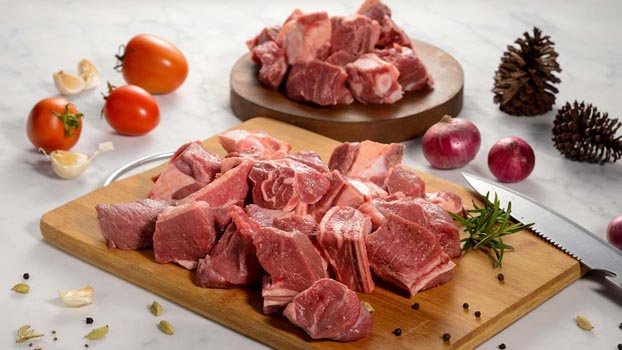Meat export shows high promise

Despite huge excess production, Bangladesh cannot exploit the potential of exporting red meat for the absence of export agreements with foreign countries and lack of international quality certificate.
Industry insiders say Bangladesh’s annual red meat production capacity is around 560 lakh tonnes, which comes mostly from cattle reared in rural areas, whereas the total consumption last year was 77 lakh tonnes -- 14 percent of the capacity.
They say the rest of the cattle are not slaughtered for meat production, resulting in missing the opportunities of exporting huge quantities of meat as frozen flesh to the international markets.
According to sources, Bangladesh lacks government-to-government (G2G) agreement with foreign countries for exporting frozen livestock meat.
The country also lacks certificate from the World Organisation for Animal Health (OIE), the intergovernmental organisation coordinating, supporting and promoting animal disease control, whose approval is mandatory for meat export.
The sources said meat production is costly due to higher cost of animal feed in Bangladesh than in most of the meat exporting countries, and the interference of the middlemen who trade a single cattle several times.
They said interference of middlemen can be stopped through an arrangement under which animals will be sold directly from farms to the retailers.
Al-Amin, Assistant General Manager of Bengal Meat, said, "The country's meat export market holds huge potential. Every day, we get demand from foreign buyers. But we can’t supply products for not having any G2G agreement and OIE certificate.”
“Another big problem is that we can't sell meat at the price at which neighbouring countries export it as our production costs are higher. As a result, we fall behind in price competition,” he said.
The export price of per kilogram of red meat in India and Pakistan is around US$ 4.50, equivalent to Tk 390. However, in Bangladesh per kg meat (beef) is sold at Tk 550-600. A kg of mutton costs Tk 800 in Bangladesh against Tk 443 in Pakistan.
Imran Hossain, President of the Dairy Farmers Association, said, "Our cattle feed price and transportation cost are very high while there are many middlemen in the business who unnecessarily add price through multiple trading.”
Experts involved in meat business suggest creating separate industrial zones to be supervised by National Food Safety Authority and the National Food Safety Laboratory to ensure production of international-standard meat and dairy products.
They say the government should take urgent initiatives to overcome the barriers Bangladesh is facing in export of red meat. They also suggest stopping the import of buffalo meat from abroad.
Livestock expert Sharif Ahmed Chowdhury, who is general manager of Palli Karma-Sahayak Foundation (PKSF), said a large number of people are employed in rearing animals and that the nation loses employment opportunities for the import of meat.
Expressing concern, he said imported meat is sold directly in the retail market without any quality approval from the authorities concerned.
According to the Ministry of Livestock, the total production of cows, goats, buffaloes and sheep in the fiscal year 2019-20 was 559.26 lakh tonnes while the demand for meat in the country was 74.37 lakh tonnes.
Farid Ahmed, President of the Bangladesh Meat Traders Association, said it would be possible to earn Tk 60,000 to Tk 70,000 crore annually by exporting meat, bones, horns, entrails and leather abroad if animals are reared and the products and processed properly.
Sources said many Middle Eastern nations import meat from countries like India, Pakistan and Myanmar. But, they said, the Middle Eastern countries have confidence in Bangladesh as a quality and Halal meat producer.
Bengal Meat is the only beef exporter in the country. After its establishment, the company opened export markets to Dubai, Kuwait, Maldives and Bahrain.
It also had been allowed to export meat to Oman, Qatar and Malaysia. Even, it tried to export meat to Saudi Arabia. But due to various complications, the company is now exporting 200,000 kg or 200 tonnes of beef a year to the Maldives and Kuwait alone after 2016. Before 2016, Bengal meat used to export 1 million kg of meat a year.


